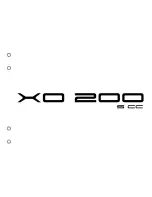
Quicksilver® 555BR — General Information
3
When people are on the working deck area for anchoring, mooring, or in emergencies, they must be
holding on and be positioned as to prevent falling overboard.
5.
Design Categories
There are four design categories of boats based upon their ability to withstand wind and water
conditions:
Category A – Designed for winds that may exceed wind force 8 (Beaufort scale – 40 knots) and a
significant wave height of 4m and above.
Category B
--
Designed for winds that include up to wind force 8 (Beaufort scale – 40 knots) and
significant wave height up to and including 4m.
Category C – Designed for winds that include up to a wind force 6 (Beaufort scale – 27 knots) and
a significant wave height up to and including 2m.
Category D – Designed for winds that include up to a wind force 4 (Beaufort scale – 16 knots) and
a significant wave height up to and including 0.3m, with occasional waves of 0.5m maximum
height.
Refer to your product capacity plate for the design category of your boat.
Gelcoat surfaces are slippery when wet. Use extreme
caution when walking on wet surfaces.
Never occupy the working decks while the boat is
underway.
Be aware of your footing while the boat is underway.
Slipping or falling could result in serious injury or death,
especially if the boat is in motion or in rough seas. Keep the
accommodation clean, so if movement is necessary, it will
be free of obstruction.
Do not attempt to boat in severe weather conditions.
Death or serious injury can occur. Get to shore before the
weather turns bad.
Area to be used during normal operation
Area to be used during anchoring, mooring and emergency operation
4.
Passenger Locations
















































